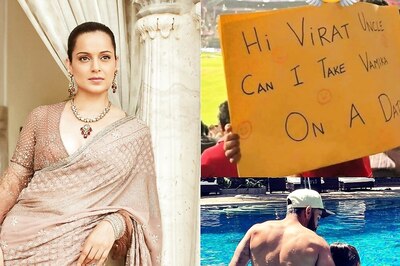
views
Is your child glued to their smartphone all day long? Are your kids constantly playing video games, way past their required screen time? Is your teen texting all the time and posting on social media? Here is a crisis in the making: over 40 percent urban Indian parents have admitted that their children, all aged between nine and 17, are addicted to videos, gaming and social media.
This is not to say that the Covid-19 pandemic and subsequent lockdowns the world over further complicated matters for parents. Being locked inside and online learning compounded a problem that had already taken root in modern households.
A survey showed that most parents believe that excessive use of gadgets and easy access via online school activity during the pandemic are key reasons that their children are addicted to social media, videos and gaming. There is also much discontent over the minimum age to open a social media account, with 68 percent of parents saying it should be raised from 13 to 15 years, as per the survey.
The survey, conducted by community social media platform LocalCircles, showed that 55 percent urban Indian parents said their children, who were aged between nine and 13, had access to a smartphone for all or most of the day, while 71 percent said their children, aged between 13 and 17, have access to a smartphone for all or most of the day.
During the first two years of the pandemic, many children were mostly confined to their homes. Besides being engaged with online learning as schools were closed, one of their favourite pastimes became using gadgets such as smartphones, tablets or laptops to watch videos, play games online, and chat with peers.
Studies show that the obsession with screen time increased during the pandemic. More troubling for urban Indian parents was allowing children as young as nine to use social media, including Facebook and Instagram, which they were not using previously.
The fear that their children were being exposed to undesirable content on the internet became all too real with many untoward incidents surfacing during this time period. To cite one reported incident, a 16-year-old boy shot his mother because she stopped him from playing online games like PubG.
The central government has reportedly set up a committee to regulate online gaming and identify a ministry to oversee and study global best practices and recommend a uniform regulation. It will also take into account protection of gamers from user harms such as addiction. The panel is soon expected to submit a report.
Minimum age on social media major concern
A survey released three years ago on December 3, 2019, showed that 82 percent of citizens wanted the government to define and enforce a minimum age for children to use, open or operate social media accounts. At that time, an overwhelming 73 percent said they did not want their children to have any access to social media till the age of 15. The same survey also indicated that 59 percent were not in favour of children aged between 11 and 13 having a social media account, even with parental consent.
Post pandemic, the new survey throws light on whether the perception of urban Indian parents about allowing their children to use social media has changed or remains the same. Parents gave feedback on the use of gadgets by their children along with consumption of social media, gaming, videos among others.
A study by the National Commission for the Protection of Child Rights showed that 37.8% of children aged 10 have a Facebook account while 24.3% have an Instagram account. Many children quote their age incorrectly to create a social media account and most sites fail to detect such activity. In some cases, parents create the social media accounts of children by submitting the wrong age.
How much average time per day are children in the age group 13-17 in your family spending on social media, video and games on the internet?
In response to this question, 62% urban Indian parents said children in this age group were spending three or more hours each day on social media, videos and games on the internet. While 28% said “over six hours”, 34% said “three to six hours”, 16% said “one to three hours”, and 6% said “up to one hour”. According to the data, 4% of the parents indicated their teenage children are “spending hardly any time on social media, videos and games”, and 6% said “they are on mobile and other devices a lot but not sure how long” while 6% could not say.
How much average time per day are children in the age group of 9-13 in your family spending on social media, videos and games on the internet?
In response to this, 49% urban Indian parents said children in this age group are spending three hours or more each day on social media, videos and online games. While 24% said “over six hours”, 25% said “three to six hours”, 20% said “one to three hours”, and 12% said “up to an hour”. The data indicated that 8% respondents indicated that their children are “spending hardly any time on social media, videos and games”, 6% said “they are on mobile and other devices a lot but not sure how long” while 5% could not say.
What is the type of device children in the age group of 13-17 have access to all or most part of their day (outside of in-person school classes)?
In response, 71% urban Indian parents said their children in the age group of 13-17 have access to a smartphone for all or most part of their day (outside of in-person school classes). In response, 35% said “desktop/laptop”, 31% said “smartphone”, and 5% said “tablet and smartphone”. The data shows in 16% cases “desktop/laptop, smartphone and tablet” are accessible to the teenagers, while 4% did not give a clear response.
Do parents feel that children in the family in the age group of 13-17 are addicted to social media, videos, gaming on the internet?
In response, 44% urban Indian parents said their children in this age group are absolutely addicted to social media, videos and gaming on the internet. While 44% said “yes, absolutely”, 36% said “yes, partially” and 20% said “no”.
Many schools have often reported this to senior school parents in group sessions, where rehabilitation and even de-addiction was needed in some cases over the past year.
Which type of device is being used by children in the age group of 9-13, and do they have access for all or most part of the day (outside of in-person school classes)?
In response, 55% urban Indian parents said their children in this age group had access to a smartphone for all or most part of the day (outside of in-person school classes). While 13% said “desktop/laptop”, 11% said “tablet”, 23% said “smartphone”, 27% said “desktop/laptop, and smartphone”, 5% said “tablet and smartphone”, while 18% said “all three devices” and 3% could not say.
Do you feel children in the age group of 9-13 in your family are addicted to videos, chat and gaming on the internet?
In response, 47% urban Indian parents said their children in this age group are absolutely addicted to social media, videos and gaming on the internet. While 47% said “yes, absolutely” and another 40% claimed “yes, partially”, 11% said “no” and 2% could not say.
What are the primary reasons that children in the age group of 9-17 in your family are addicted to social media, gaming, videos?
In response, 28% said “us providing them access to gadgets earlier than we should have”, 13% said “peer pressure”, 26% said “many of the school-related activities are becoming online”, and 31% said “children observing parents using gadgets excessively or becoming addicted to them”, while 2% could not say.
Largely, urban Indian parents felt that their own habit of excessively using gadgets and giving access to children early along with online school activity were key reasons why children were becoming addicted to social media, videos and gaming.
Many social media platforms (Instagram, WhatsApp, Discord, Snapchat, Google Hangouts, Facebook) allow a 13-year-old to create an account. What should the minimum age requirement be?
In response, 11% said it “should be 13 only”, 12% said “should be 15”, 10% said “should be 13 only with mandatory parental consent”. The majority, 56% indicated it “should be 15 with mandatory parental consent”, while 11% could not say. On an aggregate basis, 68% of urban Indian parents felt that the minimum age requirement for creating a social media account should be changed from 13 to 15 years.
What is evident in the findings of the survey is that over four in 10 urban Indian parents felt that their children in the age group of 9 to 17 were addicted to videos, gaming and social media. This is a worrying trend and needs the attention of the government, schools, parents and platforms offering such services.
What the experts are saying
Experts said overuse of social media can lead to poor sleep, irritability, stress, anxiety, depression, low self-esteem and difficulty in concentration. Most social media platforms have set 13 as the minimum age to open an account.
In the US, experts have been advising that all children up to 18 years should be screened regularly for anxiety and depression as mental health problems among them have escalated. The American Academy of Pediatrics recommends limiting device use to two hours per day at a maximum for optimal sleep quality.
Pathological social media use results in the prioritisation of virtual relationships at the cost of real-life responsibilities and relationships. “The compulsive need to constantly check and respond to social media notifications creates distractions that interrupt the course of daily activities and conversations,” states the Social Media Victims Law Center (SMVLC), which works to hold social media companies legally accountable for the harm they inflict on vulnerable users.
It is known that teenagers and adults alike check their phones upwards of 150 times a day. Social media addiction is a behavioural disorder in which teens or young adults become enthralled and are unable to reduce or cease their consumption of online media despite clear negative consequences and severe drawbacks.
“While many teenagers engage in some form of online media on a daily basis (including Facebook, Instagram, Twitter, YouTube, Discord, Snapchat, and video games), teen social media addiction is characterised by the combination of an excessive media consumption, an increasing reliance on social media as a way to feel good, and an inability to stop or curb this behavior despite suffering losses in friendship, decreased physical social engagement, and a negative impact at school,” states Paradigm, a US-based institution that treats mental health issues of teens and adolescents.
While experts have long advocated stipulated screen time for children of all ages, it looks like the pandemic put many routines out of gear in urban households and children were exposed to unlimited screen time. But at what cost?
Read all the Latest India News here




















Comments
0 comment